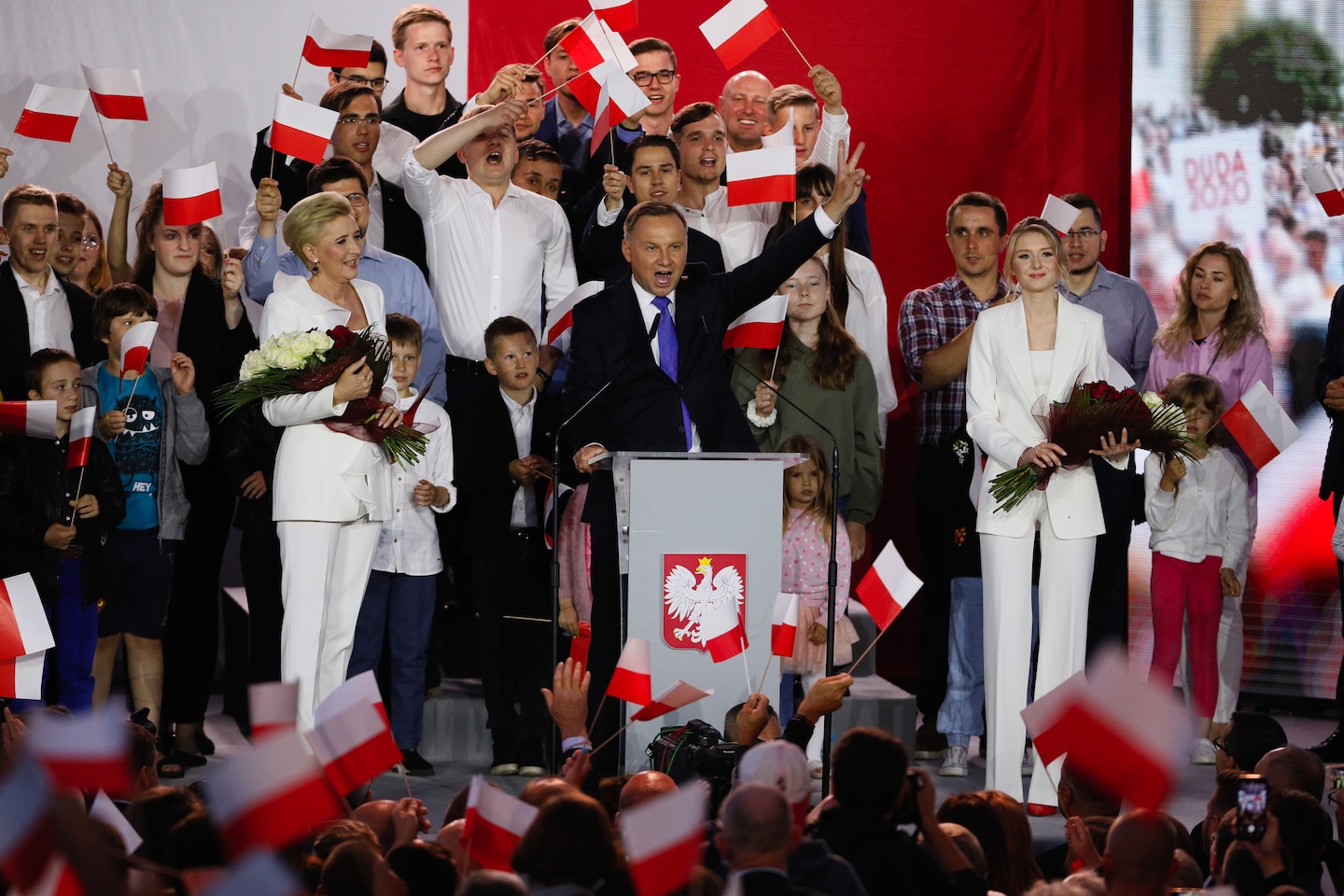Poland’s narrow election has big consequences for its democratic future

The office of the Polish president doesn’t have the same executive powers as the White House, but Duda will have the capacity to approve or reject policy formulated by the PiS-led Parliament, which probably won’t see new elections until 2023. “Analysts say they expect Law and Justice to leverage his win to further its hard-line policies, including an effort to ‘re-Polandize’ the media and bring foreign-owned outlets under Polish control,” my colleagues reported.
This follows the government’s steady erosion of Poland’s judiciary, including attempts to force out independent judges, that has earned rebuke from the European Union. “Certain independent institutions are under attack,” Trzaskowski told The Washington Post last week. “There is a great danger that the government will continue with its policies of politicizing independent institutions.”
The election campaign itself was waged as an ugly culture war, with Duda and his supporters deploying anti-Semitism, xenophobia and homophobia to attack Trzaskowski. Jaroslaw Kaczynski, PiS’s influential chairman, mused openly that the Warsaw mayor lacked a “Polish soul.” His allies embraced an aggressively anti-LGBT line — invoking the threat of a “rainbow plague” — to mobilize older, pious Catholic voters to Duda’s cause.
International election monitors decried the deepening political divisions and unfair media environment in which the vote took place. “The political polarization as well as the lack of impartiality in the public media coverage detracted from a well-run election,” said Thomas Boserup, an official for the Organization for Security and Cooperation in Europe, in a statement. “Following a campaign that was lacking in dialogue, it is especially important to emphasize that democracies are based on respect for diversity and the rights of all, not just the majority.”
Many experts aren’t convinced that Duda and PiS are interested in extending a hand across the aisle. “Given how narrow Duda’s victory was, the party is very likely to accelerate its attempts to take over the judiciary, destroy any remaining independent media and subjugate local governments that don’t toe the party line,” wrote Maciej Kisilowski, an associate professor of law and strategy at Central European University in Vienna. “These election results are a death blow to Poland’s liberal democracy. To those fighting populism around the world, they should also be a cautionary tale.”
Poland’s election played out along a familiar template: Wealthy, urban, younger and better-educated voters opted for the liberal candidate, while Duda drew much of his support from the rural Polish hinterland. “Just as in neighboring Hungary and in most of western Europe, the youthful cities are liberal,” noted an editorial in the Guardian. “But to navigate a route back to power, Poland’s opposition must find a way to win back the trust of communities that have come to associate greater economic security with the cultural conservatism and bigotry of PiS.”
To keep its grip on power, PiS may have to keep grinding the ax of division. “Poland is an ethnically homogeneous country, monolingual and overwhelmingly Catholic,” wrote Anne Applebaum in the Atlantic. “Nevertheless, Law and Justice propagandists have, over the past decade, successfully manufactured, cultivated, and promoted a tribal division that is every bit as powerful as those that are based on skin color or language.”
Not unlike Hungary under illiberal Prime Minister Viktor Orban, the powers that be in Poland may set about reshaping the political system so that the splintered opposition can’t regain power. “The question is whether they can fulfill all of these plans with 49 percent of voters and the majority of people under age 50 dead set against them,” Applebaum added. “This was an angry campaign, and some of the people who lost will remain angry. The government will have to keep the culture war going in order to drown them out.”
One check on Poland’s democratic backsliding could be the censure of other Western powers. The European Union has already tried to rein in PiS’s capture of Poland’s judiciary, to limited effect. Duda and his allies, meanwhile, cast themselves as defenders of Polish sovereignty against E.U. overreach. “It will be very difficult for the PiS government and Duda to close the divisions within society that they themselves forced apart for electoral purposes,” wrote Pawel Zerka and Piotr Buras of the European Council on Foreign Relations. “It will also be hard to convince the rest of Europe that the rights of minorities can be respected in Poland, or that Warsaw is a trustworthy partner.”
Just days before the first round of the election, Duda appeared in Washington alongside President Trump, a fellow illiberal nationalist. But U.S. observers doubt the Polish government can count on even the Trump administration — never mind if Joe Biden wins the November election — to mitigate whatever E.U. blowback comes its way.
“Turning Poland in a hard-right political direction would weaken the country’s standing in Europe and the United States alike,” wrote Daniel Fried, who served as U.S. ambassador to Poland during the Clinton administration. “While there are some hard-right elements in Poland who seek to ally themselves with the most strident nationalists around Trump, the United States is never going to be an alternative to the EU for Poland; Poland’s trade ties are with Europe, especially Germany, and the EU remains a source of development funds that Poland still needs.”
Read more:






